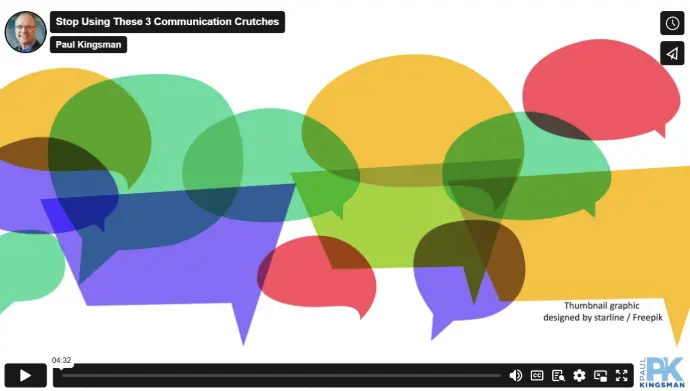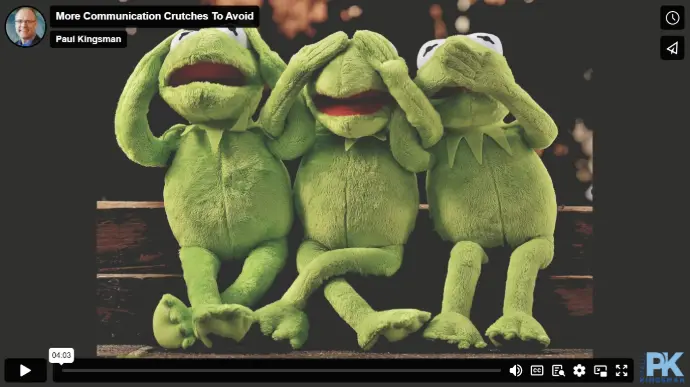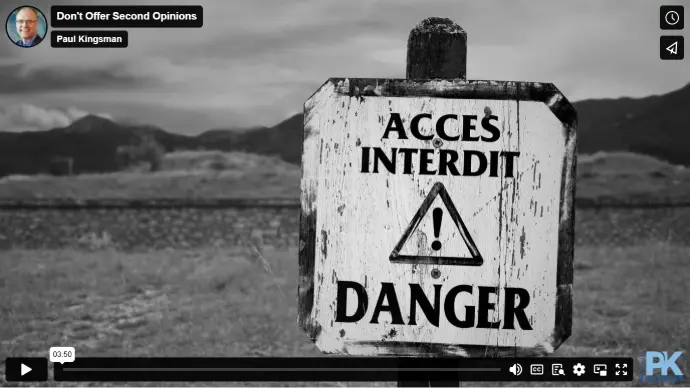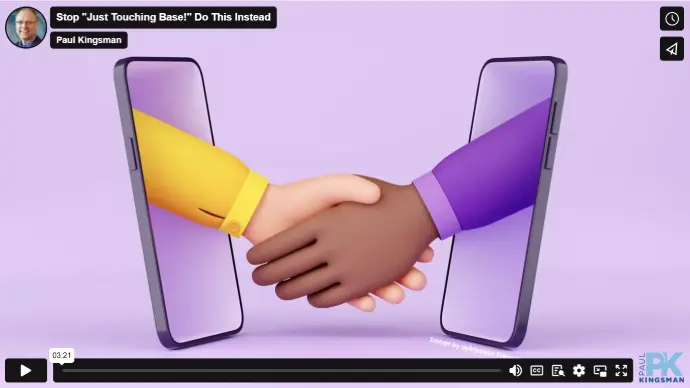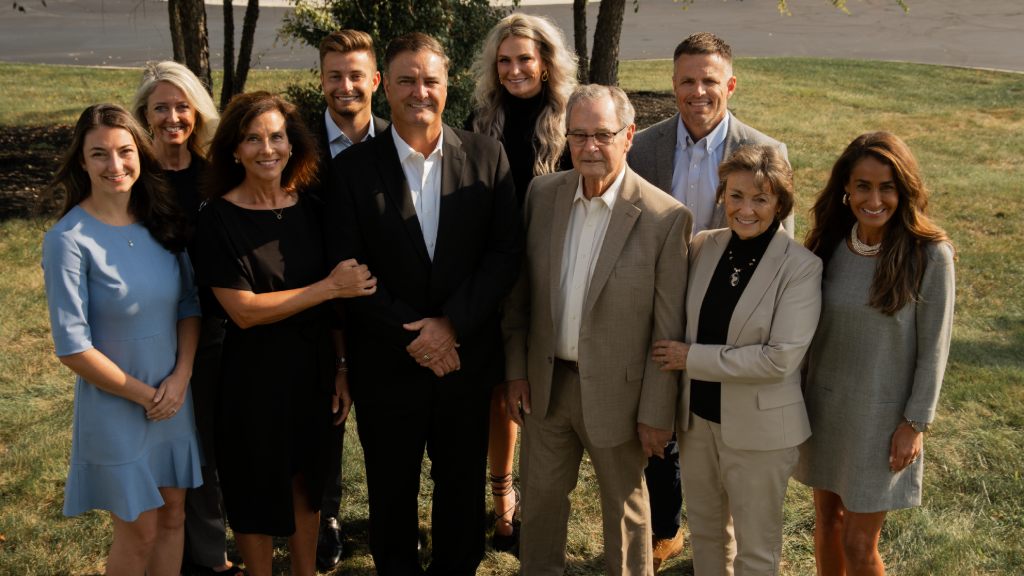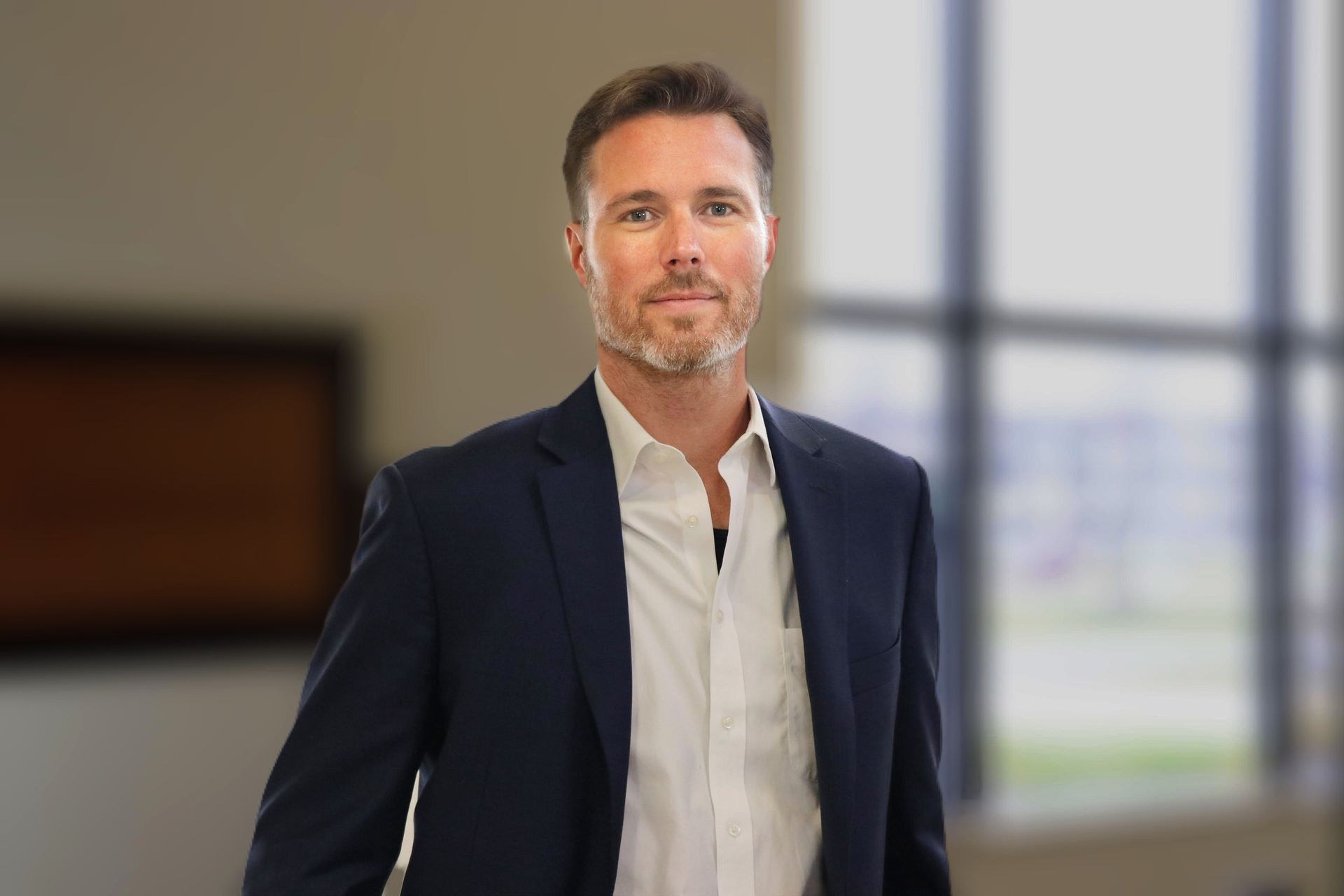Two More Communication Crutches to Avoid(Distraction-Proof Advisor)
Paul Kingsman Live on Tuesday Aug 12th
Referral Language That Works In The Real World
Many common communication crutches have little meaning and add to the noise which is already stretching people’s attention spans and emotional bandwidths. Here are two more communication habits that weaken your words. Stop using them to become a better communicator whose words hit the mark.
- Take time to think about what words to use to communicate your point most clearly.
- Once you’ve chosen your words, especially written ones, re-evaluate them to ensure you haven’t wasted any and have clarified your main point at the start.
- Be consistent: make a habit of considering your words before you speak or hit the send button. We get better when we do things excellently over and over and over.
Transcript
Today, bringing you more communication crutches you need to stop using.
…
Recently I did a post about language to avoid, and you can click on the link in this post to get caught up and see what you should not be saying. Today, I’m covering two more common phrases.
Firstly, “Hope this email finds you well.” Ugh! When I see that in the top line of an email, I usually think it’s spam. I’m just assuming that because so many people we’re connecting with are really busy, and you don’t want to waste their time and attention by using a trite, throwaway line. It doesn’t mean anything, and we hear it so often today, it means even less. Don’t begin your email communication on a weak footing. You need to grab that client’s or prospect’s attention to showcase your main point.
It could be something like, “Hi, Paul, Last Thursday when we met, I mentioned I’d follow up with you on Tuesday regarding your conversation you and Sue had when you left here to see what you wanted to do going forward.” That’s how to start it off. Again, don’t say, “Hope this email finds you well.” We see it so many times these days, it means absolutely nothing. So don’t do that.
Secondly, avoid using the response, “Great question!” I hear a lot of speakers use it, and I’m not being overly critical of them because, understandably, we want to compliment the person we’re talking with. But I also hear it when I ask advisor teams to walk me through their meeting process. When I ask them what is the first thing a client or prospect hears after they ask a question, I’m often told, “We compliment them and say, ‘Great question!'” Once again, avoid doing that. Don’t say “great question” once and think you’re going to say it again after every question. You might say it in response to the first couple of questions, but then someone will ask a question, and you won’t follow it up with, “Great question!” And they’re left sitting there thinking, “Did I ask a dumb question?” You don’t want them feeling like that, so, tighten up this language.
Make sure when you deliver the words you want to use, they’re strong—they’re not wasting anyone’s attention span. Everyone’s attention span and emotional bandwidth today are stretched. You want to make sure your words hit the mark. A great book that I’ve mentioned before and still use is Smart Brevity (by Jim VandeHei, Mike Allen, Roy Schwartz). It’s a great tool, a great resource to read through so you can become a stronger writer. Chances are it will also make you even more aware of how you sound and what you say. So it not only helps you on the writing front, but it helps you on the speaking front, as well.
So, to come a more convincing communicator,
- Think about what you’re going to say. Take time to think about what words are going to hit the mark and get used to scripting them so you use them often.
- Evaluate your words. Make sure you’re not wasting any. When you write an email, sit back before you hit send and review it. Do you need to take that line on the top and put it at the bottom? Maybe you’ve started the email with something that works just fine, but it’s not the main point. Get to the main point!
- Be consistent. We learn any new skill by doing it over and over and over again. Press yourself to think. Press yourself to consider the words you’re about to say, then practice them. Review the email before you hit send. Is it as tight as it can be? Do you get to the main point quickly?/li>
You’re going to become a far more effective communicator, and in our culture today, that’s going to pay off handsomely for you.
For more Distraction-Proof Advisor videos, click here.
CFD Companies is proud to be collaborating with Paul Kingsman.
About Paul Kingsman
Paul Kingsman, Ash Brokerage’s Practice Management Director, is a sought-after expert on how to be distraction-proof. Through his speaking, writing, and coaching, he teaches financial services professionals how to maintain focus and take practical daily steps to successfully grow their businesses and achieve outstanding long-term results. To find out more about Paul and how he can equip you or your team to achieve your own outstanding results, use the contact form below.
Use the form below to reach out to Paul.

*Paul is Registered with Ash Brokerage. Ash Brokerage is one of the largest insurance brokerages in the United States, with more than 400 employees nationwide.
About CFD Companies
CFD Companies is home to a fully independent Broker/Dealer and RIA that believe individuals are best served by a financial professional who possesses the freedom to implement personalized planning and investment strategies. The CFD Companies operate on the premise that an adviser’s Broker/Dealer and RIA should act as a partner and resource network, empowering adviser-client relationships through trust, innovative support and a shared commitment to mutual growth. Contact Us with any questions you have for us at CFD Companies.
While others operate in cliché, CFD operates in commitment. To learn more about that commitment and the future of your business in partnership with CFD, reach out to us below.
